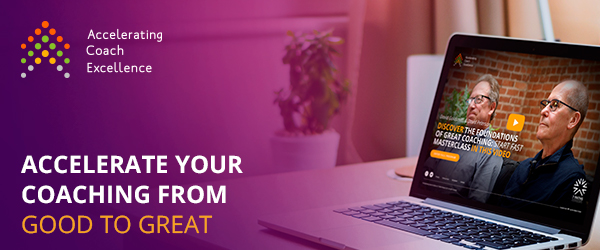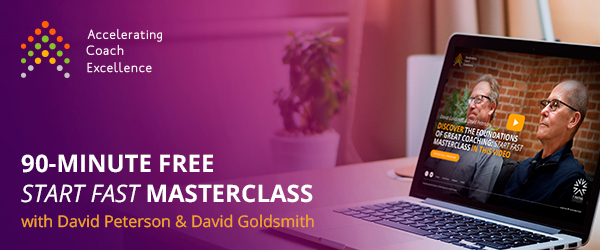
by Gary Reinecke | Nov 13, 2021 | Coach Training, Personal Development |
In last week’s blog, we took a broad look at self-assessment, one of the core competencies of a Christian coach. This week, we begin to dive deeper into what self-assessment actually means, how it is expressed through our behavior and how we can grow in awareness of ourselves. Truly understanding our own motivations and our own strengths and weaknesses will ultimately help us to better meet the needs of the people we coach.
Self-assessment is developed through several behavioral expressions. In the upcoming weeks, we will explore each of these expressions, starting with Interpersonal Awareness. Interpersonal awareness means becoming aware of and evaluating the strengths and weaknesses you bring to your coaching relationships.
I recently reflected on one of my own weaknesses when it comes to coaching: I tend to interject my own experiences into my coaching practices. As a coach, part of our job is to stay indifferent and detached. This isn’t to say we don’t care, but it’s important not to overreach and push our own opinions or agendas into the lives and situations of our clients.
As a recent example of this, I was working with a client who was navigating the best way to mobilize the house churches in his network. During the Covid pandemic, his church broke down into smaller house churches. It was a large congregation, splitting into thirty house churches, which eventually grew to fifty. That’s a lot to manage! We talked about the model for a house church and the best way to train a leader. I definitely have a lot of opinions in this area, and it was difficult for me to stay indifferent as he was choosing a route I might not have taken myself. I came to realize that the path he was choosing was actually the better option for that particular congregation.
It’s important to have an understanding of ourselves as we coach others. Because I recognize my tendency to assert my own opinions, I can intentionally hold back those opinions when it’s not appropriate to share them. A lot of this comes down to our particular behavioral styles; we don’t want to superimpose our behavior onto a client. If you aren’t sure what your behavioral style is, I’d recommend looking into DiSC.
In addition to deepening our self-awareness, we also need some prior understanding of our clients. The more we know about them, the more we can adapt to their needs. A good coach is aware of how their strengths and weaknesses interact with another’s.
Here are a few questions to ask yourself before your next session with a client:
- Do I tend to be dominant or be more passive in relationships? What about my client?
- Do I tend to control a conversation or go with the flow? What about my client?
- Is my processing slow or fast? What about my client?
- Am I task-focused or driven by the relationship? What about my client?
- Do I think in terms of the big picture or do I focus on the details? What about my client?
If you are interested in a full explanation of how our team (namely Dr. Bob Logan & Dr. Chuck Ridley) arrived at the competencies of a Christian Coach – CLICK HERE. And check out our new resource for Christian Coaching – ChristianCoachingTools.com!

Identify areas that need your focused attention as a Disciple Coach
Image by Christina Morillo on Pexels

by Gary Reinecke | Jun 29, 2020 | Personal Development, Uncategorized |
Hearing happens when we’re able to recognize a sound.
Listening happens when we put in the effort to understand what it means.
It not only requires focus, but it also requires a commitment to encountering the experience, intent and emotion behind the words. And that commitment can be scary. Because if we’re exposed to that emotion and those ideas, we discover things we might be avoiding.
Seth Godin blog June 7, 2020
At this time in our history, listening to one another – really listening, is not just important; it is essential.
On both sides of the racial divide, the local church has a special and unique role to play in facilitating meaningful conversations. I remember listening to Ray Bakke (founder of the Ray Bakke Center for Urban Transformation) many years ago, share that three institutions are ordained in society to govern, care for and give order – the family, the local church and government. Each is strategically positioned to facilitate difficult conversations. However, if the local church is left out of this strategy, the vision for reconciliation will never be achieved. Why? Because reconciliation is a spiritual issue! No other institution in society is designed to address the spiritual issues of sin, repentance and forgiveness.
How can we as church leaders facilitate conversations around the gospel to bring light to the darkness?
A current member of our Leadership Collective – Brian Wilson, Lead Pastor of Access Church in Menifee, CA recently interviewed a panel of guests to allow his congregation to listen, truly listen to the issues that divide people based upon the color of their skin. My prayer is that these exchanges help educate people on both sides of the racial divide.
Watch Part I of a two part series of this informative interview – CLICK HERE.
Questions for your reflection:
- How can our congregation be part of the solution?
- Who can we partner with to demonstrate and practice racial reconciliation?
- What can we do to sustain the process of racial reconciliation so that it is not perceived as an event?

by Gary Reinecke | Oct 22, 2019 | Coach Training, Leader Development, Personal Development |
You are probably like me. I don’t need another webinar – on anything! But if you are serious about improving your coaching effectiveness I think it would be worth checking this one out because of the presenters AND it is FREE.
Thousands of professional coaches are already registered for the complimentary Foundations of Great Coaching: Start Fast Masterclass with Google’s David Peterson and ICF’s David Goldsmith. This live 90-minute masterclass is setting records in the coaching community. Join your peers and be a part of this rare event – register now to guarantee your spot.
Secure your seat for the masterclass here
This is your chance to learn live from two of the industry’s greatest thought leaders. David and David are passionate about helping good coaches like you develop masterful skills to handle difficult and emerging client challenges.
In this complimentary masterclass, you’ll learn how to:
- Position yourself powerfully to stand out as a corporate coach
- Stay on the leading edge of coaching to future-proof your practice
- Get to the heart of client challenges in less time
- Use speed in engagements to build trust and rapport
If you’re ready to accelerate your coaching from good to GREAT, join me at this session.
Register for the Foundations of Great Coaching: Start Fast Masterclass here

by Gary Reinecke | Sep 30, 2019 | Coach Training, Leader Development, Personal Development |
Are you looking for a way to accelerate your path to becoming a GREAT coach? A way to learn secrets master coaches wish they knew when they first started, without taking decades to get there?
This month, Google’s David Peterson and ICF Co-founder David Goldsmith will host a complimentary masterclass called Foundations of Great Coaching: Start Fast and I’d love you to be my guest.
In this live masterclass, David & David will show you how to get to the heart of client challenges in less time. You’ll discover how to focus on their most urgent needs first, build rapport faster, and position yourself powerfully as a leadership coach.
This masterclass will profoundly impact the way you coach!
Register for Foundations of Great Coaching: Start Fast Masterclass CLICK HERE.
If you’re interested, I recommend that you sign up on the Wait List so that you can block-out the time on your schedule as soon as the information is available.
Feel free to share your thoughts with me on this session! Looking forward to hearing from you.
Courage,
Gary Reinecke

by Gary Reinecke | Sep 13, 2019 | Church Growth, Leader Development, Personal Development |
People learn to discover and follow Jesus in community. Few environments do that better than a small group. This begs the question, what did Jesus model for His disciples.
Small Groups do these two things with Excelllence:
- Care for People
- Develop People
Caring for people is with the whole person in mind.
What does excellent “pastoral care” look like?
In the small group I lead with my wife, Gina, we have established a “care-net” for the members of our group. What does that mean:
- when a person has a need, members are quick to respond
- when a person misses a small group event, they receive a call
- when a person shares a challenge they are facing, we pray
The list goes on; but you get the idea.
Three reflection questions to strengthen the “care-net” in your small group:
- What needs are we currently meeting in our small group?
- What other needs should we be more aware of at this time?
- How can we meet this new need and expand our “care-net”?
Next time I’ll discuss the second item on the list above: “Develop People”.

by Gary Reinecke | Sep 3, 2019 | Coach Training, Leader Development, Personal Development |
When Gina and I were married 25+ years ago we discussed and subsequently, researched a new hobby that we would like to learn together. The hobby we chose was mountain biking. We asked a friend what we needed; we bought two bikes, helmets, gloves and gear. Little by little we learned some of the finer points of our new hobby. We even bought a book and trained early in the morning to beat the heat in Phoenix to practice our skills.
25+ years later we are still learning new techniques that help us raise our riding skills.
About a month ago I was given a mountain bike magazine from Great Britain. In it was an article that caught my attention. It reminded readers of techniques for riding aggressive downhill trails. The tendency when going down a steep decline is to lean back. In contrast, the best way to ride an aggressive downhill trail is to stay on your seat, lean forward and bend your arms.
These tips have helped me immensely!
Take that same approach to coaching. If you have gone through a basic coach training course you undoubtedly know the importance of listening and asking questions. One thing I’ve discovered is that many leaders simply forget. I would like to remind you of the basics again. Read THIS BLOG as a refresher to the Five Shifts of a Great Coach.
Going back, reviewing the basics can make a BIG difference.






